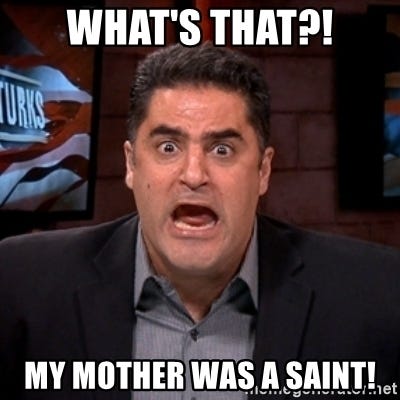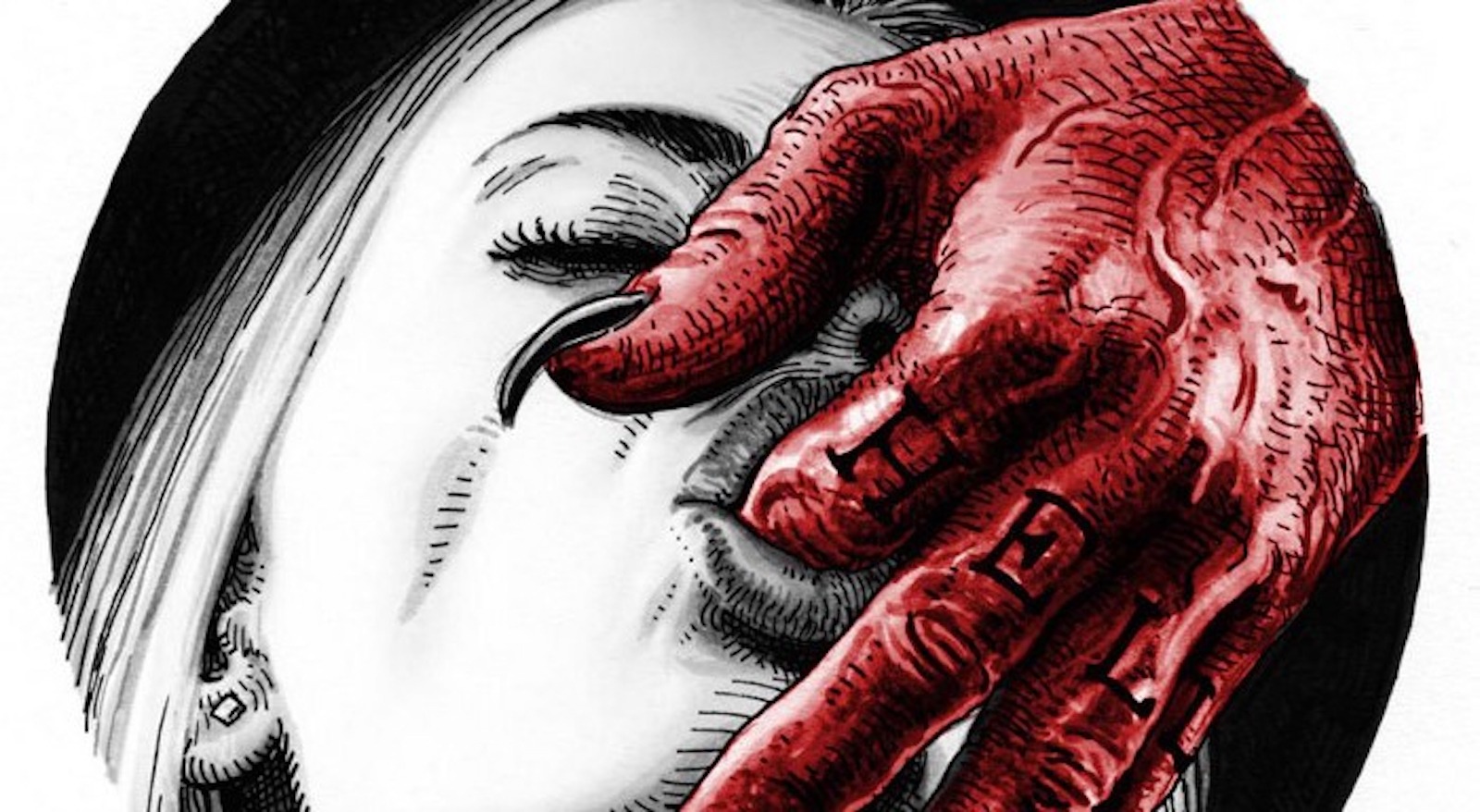“I want you to rape me!” she said.
I played it cool as best I could. But in that moment my internal narrative split, responding with equal parts “Fuck yes!” and “Oh no, I would never do that; You see, what you’re saying is an oxymoron and we’re already having consensual sex.”
Editor’s note: Ruwan Meepagala (Ruwando.com) is a friend of FEARLESS and a sex, relationships, and creativity coach for men and women – his written work has appeared in numerous publications, including Psychology Today, AskMen.com, The Good Men Project, and Orgasm Daily. This post was originally published in June 2019.
The woman I was in bed with wasn’t pathological. Outside of the bedroom she is a rational, successful woman. But in the altered consciousness of heightened arousal, something other than her rational faculties took over; something primal and ancestral. She was taken by a normally unconscious set of characteristics that Jungian psychology would call an “archetype”.
The part of me that was able to respond with “Fuck yes” was my complementary ‘masculine’ archetype. The part of me spewing a bunch of rational jumble was my controlling ego — that which kept me ‘in my head’ and held me back from full authentic expression.
Actually, the parts of us that were playing out this dark fantasy didn’t even belong to her and me individually. They were a part of the collective unconscious acting through us. They were characters in an eternal psychodrama playing out their missions.
The rape fantasy is a hyper-polarized psychodrama. In it, a woman confronts her animus, the masculine side of the female psyche; and a man confronts his anima, the feminine side of the male psyche.¹ While there are many psychodramas that allow this, the rape fantasy is so potent because it’s so taboo — contrary to the preferences of the ego.
Much of our modern anxieties, neuroses, and dysphoria comes from disconnection from our unconscious archetypes. Reintegrating our archetypes is not only a path of healing, but the key to individuation — the full expression of self.
The anima/animus is particularly impactful because it represents the “other side” within us. The harmony (or lack thereof) we have with this part of ourselves affect us from our childhood parental relationship all the way through our adult romantic relationships, up until we raise families of our own.
Integrating the other side it critical to being an uninhibited force in the world. It is the Hero’s Journey that our ego takes in order to return home.
Why do sexual archetypes exist?
First, what are archetypes:
To understand archetypes according to Jung, it may help to borrow an analogy Richard Dawkins uses to understanding genes:
In The Selfish Gene, Dawkins has us imagine our genome as a big binder full of pages — a book that makes up all the information on how to build our body. We get half the pages from our mother, and half the pages from our father. They basically get mixed up except for certain sequences of pages, ‘chapters’, that have proven to be effective in survival till procreation. These persisting chapters are genes. Genes are not a standard unit, but a bundle of information that corresponds to a certain part of our ‘book’.²
Archetypes are similar, but corresponding to the human psyche. Instead of ‘chapters’, they are like ‘character profiles’: sets of thoughts, feelings, and behaviors that have been so useful to the human psyche that they have become universal. When an archetype seems to be in every person’s psyche, we say it’s part of the collective unconscious.

When dissociated, archetypes can have a ‘mind of their own’
At birth, our psyche is complete and whole. Infants don’t see separation between themselves and what they experience. They don’t experience internal conflict, because all is one. But as the world is learned, the ego must develop in order to interface with it.
Some impulses are deemed ‘good’ and others ‘bad’ based on the norms of our environment. The bad ones are shoved into the ‘dark’ of the unconscious.
Our ego is the identity we develop to interface with the world and “captain the ship.”
Contrary to what spiritualists say, the ego is not evil or something to be deleted. It’s as necessary a part of us as any other part. It just happens to be a ‘newer’ part. And when the newer part is unkind to the older parts, bad things can happen.
We can imagine a situation where a recent college grad is hired to captain a ship of old-timers. The brash young captain thinks he knows how things “should be”, so disregards the suggestions of the veterans. He quarantines ones who oppose him and locks them below in the brig. The result is a poorly functioning crew with constant conflict.
Afflictions like inexplicable anxiety, self-sabotage, internal disarray, and compulsions can all be results of banishing archetypes to the dark. Even worse is when our ego steers the ship so far off course that the ‘dark’ archetypes must mutiny — sabotaging our lives.
The book and movie Fight Club demonstrate a psychodrama of the masculine ego and archetype. The main character created a false life chasing work promotions and consumer products that completely went against his archetypal desire. So his repressed hyper-masculine archetype completely dissociated into another identity, Tyler Durden. This archetype destroyed his former life and did dangerous things to compensate for past inauthenticity.
Repressed archetypes reveal themselves in high arousal
Usually, we can only see our unconscious motives when the ego is subdued. This is why Jungian psychology is so heavy on dream analysis. This is also why many people find healing in psychoactive plant medicines — the hallucinations symbolize truths that the ego has been unable to recognize before.
Another place our unconscious shows up is in sexuality. One reason for this is that arousal is a mind-altering drug.
Visceral bliss states are closer to dream consciousness than waking consciousness. That’s why promises made during orgasm won’t hold up in court.
But there’s another reason sex reveals the unconscious. And to understand this, we need to look again at the rape fantasy.
Sexual Archetypes and the Soul:
Power exchange is an ancient narrative
Sexual archetypes are some of the most concrete because they are so tied to our biology. Clinical studies show that the presence of testosterone, the male sex hormone, directly correlates to behavioral impulses we consider ‘masculine’: aggression, competition, assertion of will, utilitarianism (at the expense of empathy), logical and numerical orientation, penetration (literal and figurative).³
The same correlation is found between oxytocin and impulses we consider ‘feminine’: empathy, nurturing, social awareness, yielding of will, egalitarianism, receptivity (literal and figurative.)
It’s actually more accurate to call them ‘testosterone and oxytocin’ traits over masculine-feminine because they exist to some degree in all of us. In order to be healthy and complete we need both, even if one is naturally stronger than the other in us.
The aspect of the masculine-feminine (or testosterone-oxytocin) dynamic that is highlighted in the rape fantasy is that of apparent power. The male pole does, the female end receives. While women can be rapists too, the physical act is always of a phallic appendage entering a receptive vessel.

I’ll avoid political commentary on whether this power exchange is ‘good’ or not. Power dynamics have served an important function in human cohesion, and they also have causes much distress in humanity.
But for our own personal development, it’s more important to acknowledge that it exists, and it’s commonly repressed.
We eroticize repressed elements.
The rape fantasy is taboo because it’s so counter-logical.
“It’s not like I actually want to be raped,” many women have said to me. “But for some reason it turns me on to think about.”
Sexual fantasies are not always desires. Just as our dreams are not literal instructions of what to do in real life. (If so we all ought to go to school without pants.) Fantasies are often a mechanism of the unconscious to reveal a truth.
My friend Om Rupani often says that “We eroticize our pain.” He explains that that’s why so many people find healing in BDSM.⁴ You might have repressed emotional pain that’s a ‘level 8’ on a 1–10 scale. Your ego won’t let you go there consciously. But the ego can’t deny physical pain. So if you reach level 8 of sensation, the ego can’t help you experience all the equivalent emotions.
Conversely, when an unconscious element feels it needs to be heard, it might show up as an unexpected sexual desire. The unconscious mixes in visceral pleasure to make the emotional pain bearable. It’s the spoonful of sugar that helps the medicine go down.⁵
I once met a man whose ancestors were perpetrators in a major genocide. He was so overcome with guilt that he developed uncontrollable sexual fantasies about being tortured.
I once met a woman whose father criticized her for having ugly feet which caused her self-esteem issues at a young age. For a long time she had fantasies of men penetrating her with their toes.
One of the most common customers for pro-dominatrices are ‘alpha male CEOs’. Such men’s anima doesn’t get to express in daily life so it gets finds an extreme way to get it’s needs met in what we might call a ‘fetish’.
Even common fantasies like that of teachers, secretaries, and MILFs likely point to minor repressed anguish around frustration at school, powerlessness at work, or anger at female caretakers. They aren’t necessarily pathologies. They are our unconscious’s attempt to satisfy a need.
For a woman who has experienced sexual trauma, the rape fantasy can seem like an obvious way to get catharsis — to intentionally replay a traumatic scene to reclaim authority.
But many women who haven’t experienced sexual trauma also have rape fantasies. In that way it’s an ancestral aspect of the Feminine archetype — An eroticization of a collective psychodrama, of which many women tend to carry one role, and many men the other.
Archetypes seeks their reciprocal in others.
Even more taboo than the desire to be raped, is the desire to rape. If a man admitted that publicly, he’d be ruined. But you’ll hear guys share that periodically in clandestine men’s groups. I’ve seen multiple guys break down into tears from the shame that they fantasized about raping a woman on the subway.
It’s not that these guys wanted to actually violate, any more than a woman actually wants to be violated. These fantasies and impulses comes from characters within us. They are a part of us whether we like it or not, like an allergy to peanuts or double jointed thumbs.
The anima/animus is typically imprinted by our opposite sex parent. Regardless of gender or sexual orientation, our relationship to this part tends to recur in our sexual relationships. This is because, on some level, every emotionally significant interaction maps to a part of our psyche. Our repressed traits show up the loudest.
Any time I coach someone who complains about ‘narcissists’ in their life, it’s almost always the case that they are repressing their inner ‘attention whore’. Or rather, they have shamed the healthy part of themselves that desires attention, so now it’s perverted into narcissism that they unconsciously satisfy in external relationships.
One could argue that the part of me that could say “fuck yes” to play perpetrator in the rape fantasy, was really her animus acting through me. And the part of her that wanted to be raped was my anima. In another sense, these dark expressions of anima and animus didn’t belong to either of us. They were impersonal beings using us to fulfill their roles.
Often the urge to individuation appears in veiled form, hidden in the overwhelming passion one may feel for another person. (Marie-Louise von Franz)
Psychodramas bring our archetypes back from the dark.
According to Jung and his colleagues, a man’s anima forms with the traits of his mother, and is molded by the women he is intimate with.

I’ve found in my coaching practice that men with a Madonna-Whore complex are still stuck in a child-like relationship with their mother. They rely on mommy’s emotional support over developing their own inner feminine. So it’s hard for them to see a woman as both loving and sexual.⁶
To connect with the anima is one of the most fulfilling things a man can do. Psychologist Marie-Louise von Franz writes:
“Whenever a man’s logical mind is incapable of discerning facts hidden in his unconscious, the anima helps him dig them out… The positive function occurs when a man takes seriously the feelings, moods, and expectations, and fantasies sent to him by his anima, and when he fixes them in some form — for example, in writing, painting, music, or dancing… putting a man’s mind in tune with the right inner values and thereby opening the way into more profound inner depths.” ¹
According to von Franz, when a woman connects with her animus, she accesses the testosterone-driven traits of “initiative, courage, objectivity, and spiritual wisdom.”
A woman’s animus can also mirror the traits of her father, but as von Franz observed, in many women “the animus appears as a group of men… a collective rather than personal element.”¹ Such a woman will experience her masculinity as more general traits, rather than the specific characteristics of her father. Hence the common fantasy of many anonymous men, a.k.a. the gang bang.
Sexual fantasies aren’t necessarily about the sex. I’ve met lesbians who have zero interest in men, but still have male gang bang fantasies. Fantasies can just be your unconscious working something out. Your unconscious maybe thought you might prefer to watch something sexy over a horror flick.
The woman who asked me to rape her wasn’t speaking from her ego. A deeper, older character saw an opportunity to get a need met — to reclaim power in a way that felt good.
And she also gave me a gift. She gave me an opportunity to embody (and integrate) an element of my masculinity that I typically didn’t accept — the part that gets off on domination and power — in a safe and consensual psychodrama. I could intellectualize the virtue of male aggression, but until I had a consenting partner to play the other role, it was just the stuff of my ego.
In a sense, she was my anima and I was her animus. At least for those moments of ego-disabling arousal.
In order to be our most powerful individuated selves, we can’t leave pieces of us behind. Dark fantasies are not always comfortable to look at nor do they always make sense. But our sexuality gives us a chance to look at our unconscious, and bring our darkness into the light.
I’m teaching a Masculine Archetype class + 21 Day Challenge for men. You can sign up for both here.
[1] Man and His Symbols by Carl Jung & his top students.
[2] The Selfish Gene by Richard Dawkins. I slightly abbreviated the analogy for simplicity: Our ‘pages’ aren’t totally mixed up as certain pages correspond to certain ‘parts of the book’, i.e. the blue eye page goes in the part of the book on eye color.
[3] The Virility Paradox by Dr. Charles Ryan. You can catch our interview on his book here.
[4] His work can be found in his book, Prerequisites to Ecstasy
[5] I share some non-sexual ways to deal with emotional resistance in my RELEASE system.
[6] The Madonna-Whore complex is a common cause of psychosomatic sexual dysfunction. Many men I’ve coached could perform fine with random women, but found they could not maintain arousal with a woman they loved.
More content featuring Ruwan:
How to Meet Women Who Like You – What Most Dating Coaches Are Missing | Becoming FEARLESS









